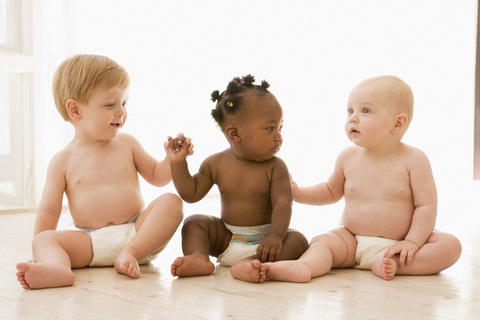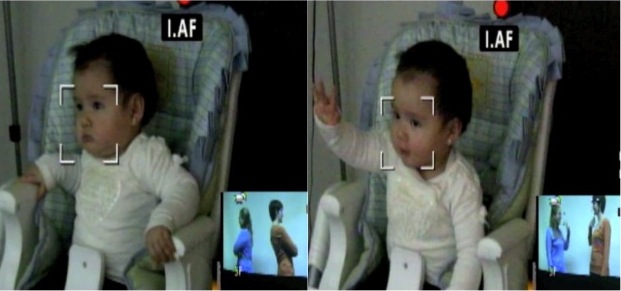
Babies as young as 9 months old know that friends usually have similar interests, new research suggests.
The new study, published online January in the Journal of Experimental Psychology: General, shows that babies who are too young to talk still have a set of abstract expectations about the social world.
"Nine-month-old infants are paying attention to other people's relationships," said study co-author Amanda Woodward, a psychology professor at the University of Chicago. "Infants are able to watch two strangers interact in the movie and then make inferences about whether those two people are likely to be friends," said Woodward, referring to a movie showed to the babies during the experiment.
Baby brainiacs
Behind their wide-eyed, innocent facades, babies possess a surprising grasp of how the world works. Infants are born wired with a primitive number sense, have an innate grasp of physics and even know that living organisms should have guts. [Incredible! 9 Brainy Baby Abilities]
They also have expectations about people's interactions. From a young age, babies know that might-makes-right, and want justice meted out to wrongdoers. By a year-and-a-half, many little ones can guess what people are thinking.
But researchers didn't know what babies knew or thought about friendship. Drawing from an assumption many adults hold — that friends have similar interests — Woodward and her colleagues wanted to see whether babies also had a buddies-think-alike intuition.
Sign up for the Live Science daily newsletter now
Get the world’s most fascinating discoveries delivered straight to your inbox.
The researchers had 64 nine-month-olds watch two videos of two actors eating a mystery food from two differently colored containers. Sometimes the actors smiled and said, "Ooh, I like it," or made faces of disgust and said, "Eww, I don't like that." (The team chose to use food, because it plays a central role in many social gatherings with family and friends.)

The two actors either had similar food preferences or opposing ones.
Afterward, the tots watched a video of the two people meeting and either being friendly to one another or giving each other the cold shoulder.
It's all in the gaze
Though infants can't say what they're thinking, they reveal their thoughts by what they pay attention to, Woodward told LiveScience. "When they see events that are inconsistent or unexpected, they tend to look at them longer," she said.
The youngsters stared longer at videos of people with opposing views who were friendly to each other, suggesting the babies expected the two people who disagreed on food to be foes. Infants also stared longer at unfriendly people who still liked the same foods.
The findings suggest that even at a young age, babies expect people with similar likes and dislikes to be friends, and those who disagree to be unfriendly.
Babies may be wired to expect this behavior, Woodward said.
In their short lives, "babies probably didn't learn this expectation from experience," Woodward said. "It's some expectation that they are in some way prepared to have."
Follow Tia Ghose on Twitterand Google+. Follow LiveScience @livescience, Facebook & Google+. Original article on LiveScience.

Tia is the managing editor and was previously a senior writer for Live Science. Her work has appeared in Scientific American, Wired.com and other outlets. She holds a master's degree in bioengineering from the University of Washington, a graduate certificate in science writing from UC Santa Cruz and a bachelor's degree in mechanical engineering from the University of Texas at Austin. Tia was part of a team at the Milwaukee Journal Sentinel that published the Empty Cradles series on preterm births, which won multiple awards, including the 2012 Casey Medal for Meritorious Journalism.









